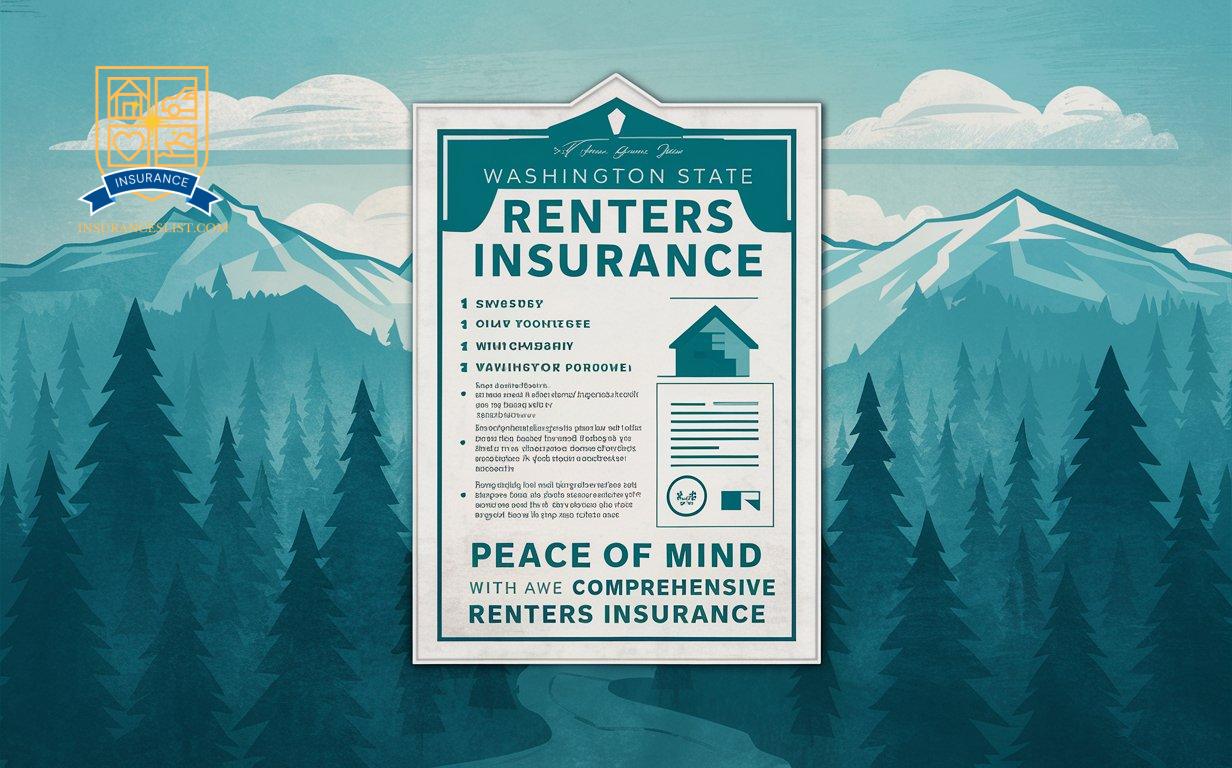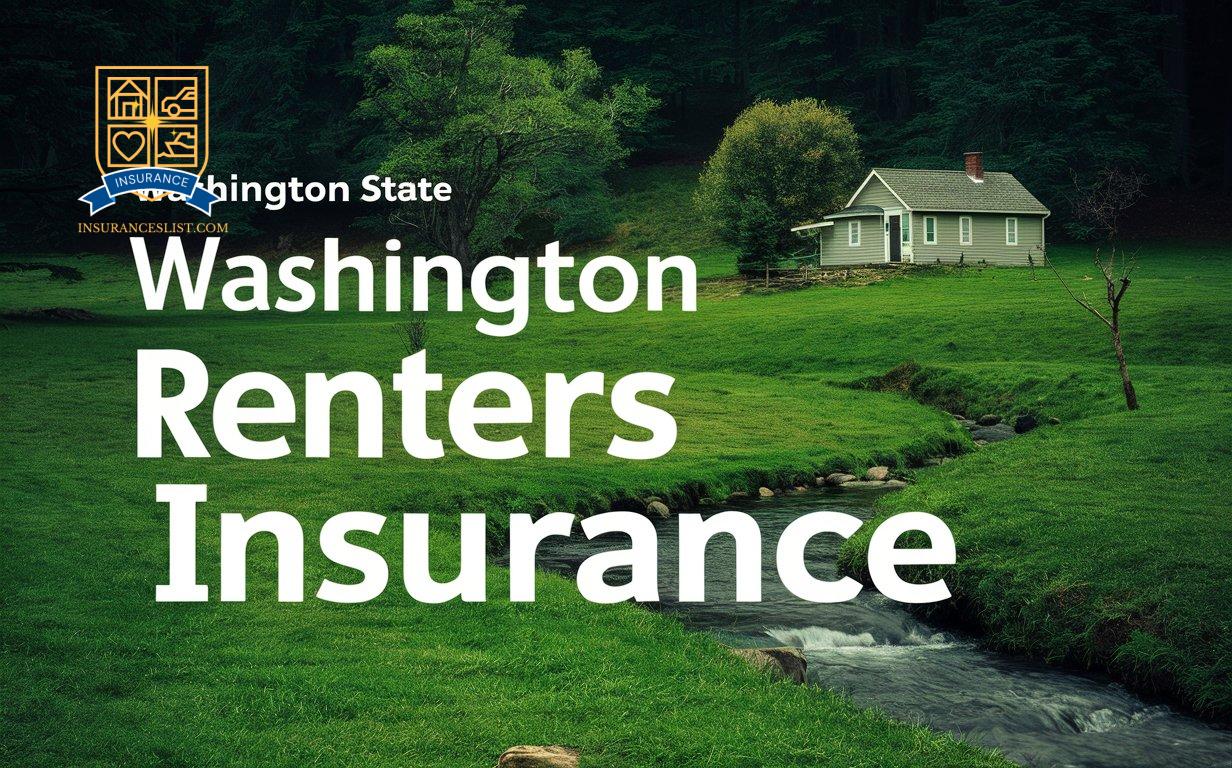Whether you’re a first-time renter or a seasoned tenant, understanding the intricacies of renters insurance in Washington is essential to safeguarding your personal belongings, maintaining financial stability, and ensuring peace of mind. This comprehensive guide delves into the world of best renters insurance Washington state, exploring the key components, legal requirements, coverage essentials, cost considerations, and the decision-making process to help you find the perfect policy for your unique needs.
Understanding Renters Insurance in Washington
Renters insurance is a type of insurance policy that provides coverage for individuals who are renting their living spaces, whether it’s an apartment, condominium, or a house. Unlike homeowners insurance, which protects the property itself, renters insurance focuses on safeguarding the renter’s personal belongings and liability.
The primary components of renters insurance in Washington state include:
- Personal Property Coverage: This coverage protects your personal possessions, such as furniture, electronics, clothing, and other valuables, in the event of theft, fire, or other covered perils.
- Liability Coverage: This aspect of the policy provides protection if someone is injured in your rental unit or if you accidentally cause damage to someone else’s property. It covers legal expenses and potential settlements.
- Additional Living Expenses: If your rental unit becomes uninhabitable due to a covered event, this coverage can help pay for temporary living arrangements, such as hotel stays or alternative housing.
By understanding these key elements, Washington renters can make informed decisions to safeguard their financial well-being and ensure they have the necessary protection in place.
Legal Requirements and State-Specific Provisions

In Washington State, there are specific laws and regulations that govern the requirements for renters insurance. The Washington State Insurance Commissioner serves as the primary authority on insurance-related matters, overseeing the industry and providing resources for consumers.
While Washington state does not have a statewide mandate for renters to carry insurance, some landlords may require their tenants to maintain a renters insurance policy as a condition of the rental agreement. This is often done to protect the landlord’s own financial interests in the event of tenant-related damages or liabilities.
The Washington Residential Landlord-Tenant Act outlines the rights and responsibilities of both landlords and tenants, including the potential for landlords to require renters insurance. Renters should be aware of their local laws and any specific requirements set forth by their landlords.
Coverage Essentials
Renters insurance in Washington state provides comprehensive coverage for a variety of situations, protecting both your personal belongings and your financial well-being.
Personal Property Coverage: This aspect of the policy covers the replacement or repair of your personal items, such as furniture, electronics, clothing, and other valuables, in the event of theft, fire, or other covered perils. It’s important to accurately assess the value of your belongings to ensure adequate coverage.
Liability Coverage: Renters insurance in Washington provides liability protection, which covers legal expenses and potential settlements if someone is injured in your rental unit or if you accidentally cause damage to someone else’s property. This can be especially crucial in a litigious environment.
Loss of Use Coverage: If your rental unit becomes uninhabitable due to a covered event, such as a fire or natural disaster, this coverage can help pay for temporary living arrangements, including hotel stays or alternative housing, as well as additional living expenses.
It’s important to note that renters insurance policies may have exclusions, such as damage caused by floods, earthquakes, or intentional acts. Understanding the details of your policy and any additional coverage options, such as earthquake insurance or flood insurance, is essential to ensure you have the necessary protection.
Cost and Factors Affecting Premiums in Washington
| Company | Price | Coverage |
| American Family | $10/month | Personal property, liability, medical payments, additional living expenses |
| Amica | $12/month | Personal property, liability, medical payments, additional living expenses |
| Arbella | $15/month | Personal property, liability, medical payments, additional living expenses, loss of use |
| Chubb | $18/month | Personal property, liability, medical payments, additional living expenses, loss of use, identity theft protection |
| Farmers | $11/month | Personal property, liability, medical payments, additional living expenses |
| GEICO | $9/month | Personal property, liability, medical payments, additional living expenses |
| Grange | $14/month | Personal property, liability, medical payments, additional living expenses, loss of use |
| Hartford | $16/month | Personal property, liability, medical payments, additional living expenses, loss of use, identity theft protection |
| Liberty Mutual | $13/month | Personal property, liability, medical payments, additional living expenses |
| Lloyd’s | $20/month | Personal property, liability, medical payments, additional living expenses, loss of use, identity theft protection, flood insurance |
| Nationwide | $12/month | Personal property, liability, medical payments, additional living expenses |
| Pemco | $15/month | Personal property, liability, medical payments, additional living expenses, loss of use |
| Progressive | $10/month | Personal property, liability, medical payments, additional living expenses |
| Safeco | $14/month | Personal property, liability, medical payments, additional living expenses, loss of use |
| State Farm | $11/month | Personal property, liability, medical payments, additional living expenses |
| Travelers | $17/month | Personal property, liability, medical payments, additional living expenses, loss of use, identity theft protection |
| USAA | $10/month | Personal property, liability, medical payments, additional living expenses |
| Wawanesa | $13/month | Personal property, liability, medical payments, additional living expenses |
| Westfield | $16/month | Personal property, liability, medical payments, additional living expenses, loss of use, identity theft protection |
| Zurich | $19/month | Personal property, liability, medical payments, additional living expenses, loss of use, identity theft protection, flood insurance |
| see more | https://insuranceslist.com/renters-insurance-washington-state/ | |
The average cost of renters insurance in Washington state is typically between $15 and $30 per month, though the actual premium can vary depending on several factors.
Location: The specific region within Washington State can influence the cost of renters insurance. Factors such as population density, crime rates, and natural disaster risks can impact the premiums.
Deductible: The chosen deductible, which is the amount you pay out-of-pocket before the insurance coverage kicks in, can significantly affect the monthly premium. Generally, a higher deductible results in lower premiums.
Coverage Limits: The amount of coverage you select for your personal belongings and liability protection can also impact the overall cost of your renters insurance policy.
To help reduce the cost of renters insurance in Washington, you can consider the following strategies:
- Increase your deductible: A higher deductible can lead to lower monthly premiums.
- Bundle policies: Many insurance providers offer discounts for bundling renters insurance with other policies, such as auto insurance.
- Improve your credit score: Insurance companies often use credit-based insurance scores to determine premiums, so maintaining a good credit score can help lower your costs.
- Take advantage of available discounts: Some insurers offer discounts for safety features, security systems, or even your profession.
By understanding these cost factors and exploring ways to optimize your renters insurance in Washington, you can find a policy that provides comprehensive coverage at an affordable price.
Choosing the Right Renters Insurance Policy

Selecting the right renters insurance policy in Washington state requires careful consideration of various factors. It’s essential to evaluate the coverage options, customer service, and financial stability of the insurance providers to ensure you’re making an informed decision.
When assessing different renters insurance providers in Washington, consider the following:
- Coverage Options: Ensure the policy covers your specific needs, including personal property, liability, and additional living expenses. Compare the coverage limits and deductibles.
- Customer Service: Investigate the insurer’s reputation for responsive claims handling and effective communication with policyholders.
- Financial Stability: Choose an insurance provider with a strong financial rating and a proven track record of paying out claims.
- Policy Types: Understand the differences between replacement cost and actual cash value policies, as they can significantly impact the coverage and payouts.
By carefully evaluating these factors, Washington renters can find the best renters insurance policy that provides comprehensive coverage and peace of mind.
Special Considerations for Washington Renters
Washington State’s unique geographic and environmental characteristics require special considerations when it comes to renters insurance.
Natural Disaster Risks: Certain regions of Washington are prone to natural disasters, such as earthquakes, floods, and wildfires. Renters in these areas should consider additional coverage options, like earthquake insurance or flood insurance, to ensure they are fully protected.
Student and Shared Housing: For renters in student housing or shared living situations, such as apartments or condominiums, it’s essential to understand the coverage implications. Policies may need to be tailored to accommodate multiple occupants and shared living spaces.
Inventory Management: Maintaining a detailed inventory of your personal belongings can simplify the claims process and ensure you receive the appropriate compensation in the event of a covered loss.
By addressing these special considerations, Washington renters can make informed decisions and find the best renters insurance policy that meets their unique needs and provides the necessary protection.
How to File a Claim
If you experience a covered event, such as theft, fire, or water damage, the process of filing a renters insurance claim in Washington state involves several key steps:
- Notify your insurance provider: Contact your insurance company as soon as possible to report the incident and initiate the claims process.
- Document the loss: Gather evidence, such as photos, receipts, and a detailed list of the damaged or stolen items, to support your claim.
- Provide necessary information: Be prepared to share details about the incident, including the date, time, and circumstances, as well as the estimated value of the lost or damaged items.
- Cooperate with the claims adjuster: Work closely with the insurance company’s claims adjuster to facilitate the investigation and expedite the resolution of your claim.
- Follow up and monitor the process: Stay in regular communication with your insurance provider to ensure the timely processing and settlement of your claim.
By understanding the claims process and being proactive in your approach, Washington renters can navigate the renters insurance claim process efficiently and receive the compensation they are entitled to.
Renters Insurance Myths Debunked

Myth 1: “My landlord’s insurance will cover my belongings.” Landlord’s insurance typically only covers the building itself, not the personal possessions of the tenants. Renters are responsible for protecting their own belongings through a renters insurance policy.
Myth 2: “Renters insurance is too expensive.” As mentioned earlier, the average cost of renters insurance in Washington state is relatively low, often between $15 and $30 per month. By considering factors like deductibles and available discounts, renters can find affordable coverage that fits their budget.
Myth 3: “I don’t have enough valuables to warrant renters insurance.” Even if you don’t own high-value items, the cumulative cost of replacing everyday belongings like clothing, electronics, and furniture can quickly add up. Renters insurance provides valuable protection for your personal property.
Myth 4: “Renters insurance doesn’t cover natural disasters.” While it’s true that renters insurance may not automatically cover certain natural disasters like earthquakes or floods, you can often purchase additional coverage or endorsements to protect against these specific risks in Washington state.
Myth 5: “I don’t need renters insurance because I’m a careful tenant.” Even the most responsible renters can experience unexpected incidents, such as a fire or a burglary, that can result in significant financial losses. Renters insurance provides a safety net to help you recover from such events.
By debunking these common myths, we hope to encourage Washington renters to recognize the importance of renters insurance and take the necessary steps to protect their financial well-being.
Additional Resources and Tools
To further assist Washington renters in navigating the world of renters insurance, we’ve compiled a list of valuable resources and tools:
- Washington State Department of Insurance: This government agency provides comprehensive information, educational resources, and guidance on insurance-related matters, including renters insurance.
- Online Comparison Tools: Utilize online platforms that allow you to compare renters insurance quotes from multiple providers in Washington state, helping you find the best coverage at the most competitive rates.
- Inventory Management Apps: These digital tools can help you create and maintain a detailed inventory of your personal belongings, simplifying the claims process in the event of a covered loss.
- Renters Insurance Calculators: Use online calculators to estimate the appropriate coverage limits and deductibles based on the value of your possessions and your specific needs as a Washington renter.
- Consumer Reviews and Ratings: Research insurance providers’ customer satisfaction ratings and reviews to identify companies known for their exceptional service and claims handling in Washington.
By leveraging these resources and tools, Washington renters can make informed decisions, find the best renters insurance policy, and ensure they have the necessary protection in place.
Frequently Asked Questions (FAQ)
- What is the average cost of renters insurance in Washington state?
The average cost of renters insurance in Washington state is typically between $15 and $30 per month, though the actual premium can vary based on factors such as location, coverage limits, and deductibles. - Do I need renters insurance in Seattle?
While Washington state does not have a statewide mandate for renters to carry insurance, many landlords in Seattle may require their tenants to maintain a renters insurance policy as a condition of the rental agreement. It’s important to review your lease and local requirements. - How do I compare renters insurance policies in Washington?
You can compare renters insurance policies in Washington by using online comparison tools, which allow you to input your information and receive quotes from multiple providers. Additionally, you can reach out to individual insurers to discuss coverage options and pricing. - What does renters insurance cover in Washington?
Renters insurance in Washington typically provides coverage for your personal property, liability protection, and additional living expenses if your rental unit becomes uninhabitable due to a covered event. It’s important to review the specific details of the policy to understand the coverage inclusions and exclusions. - Can landlords in Washington require renters insurance?
Yes, landlords in Washington state can require their tenants to maintain a renters insurance policy as part of the rental agreement. This is often done to protect the landlord’s financial interests in the event of tenant-related damages or liabilities. - What are the best renters insurance companies in Washington?
Some of the best renters insurance companies in Washington include State Farm, Allstate, Geico, Progressive, and Lemonade. When evaluating providers, consider factors such as coverage options, customer service, financial stability, and available discounts. - How do I file a renters insurance claim in Washington?
To file a renters insurance claim in Washington, you should contact your insurance provider as soon as possible to report the incident and initiate the claims process. Be prepared to provide documentation, such as photos and a detailed list of the damaged or stolen items, to support your claim. - What is not covered by renters insurance in Washington?
Typical exclusions in renters insurance policies in Washington may include damage caused by floods, earthquakes, or intentional acts. It’s essential to review the policy details to understand the specific coverage limitations and consider purchasing additional coverage, such as flood insurance or earthquake insurance, if needed. - Are roommates covered under one renters insurance policy?
The coverage for roommates under a single renters insurance policy can vary. Some insurers may allow multiple tenants to be listed on the same policy, while others may require separate policies. It’s important to discuss this with your insurance provider to ensure proper coverage for all occupants. - How much renters insurance should I buy in Washington?
The amount of renters insurance you should buy in Washington depends on the value of your personal belongings, your liability exposure, and your specific needs. It’s generally recommended to have coverage limits that adequately protect your assets and provide sufficient liability protection.
Conclusion
In the dynamic rental landscape of Washington state, renters insurance has emerged as a crucial safeguard for individuals and families seeking to protect their financial well-being. By understanding the intricacies of renters insurance in Washington, from coverage essentials to cost considerations and claims processes, renters can make informed decisions to secure the best renters insurance policy that meets their unique needs.
Whether you’re a first-time renter or a seasoned tenant, evaluating your personal circumstances, exploring available resources, and comparing renters insurance providers will empower you to find the coverage that provides the necessary protection and peace of mind. By prioritizing renters insurance in Washington, you can rest assured that your personal belongings, financial stability, and overall well-being are safeguarded against the unexpected.

